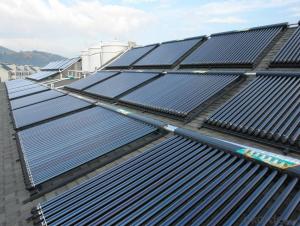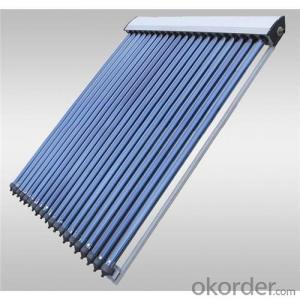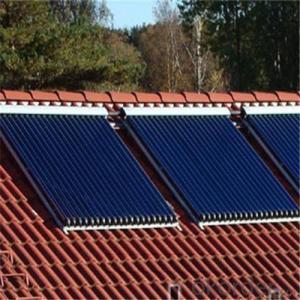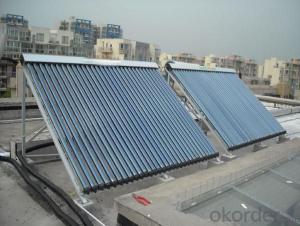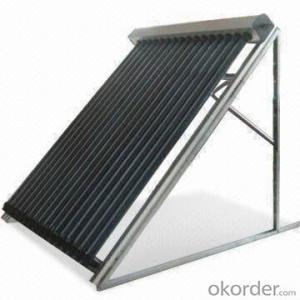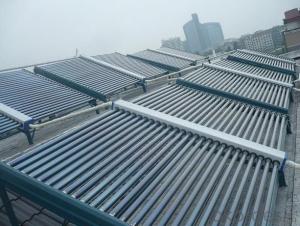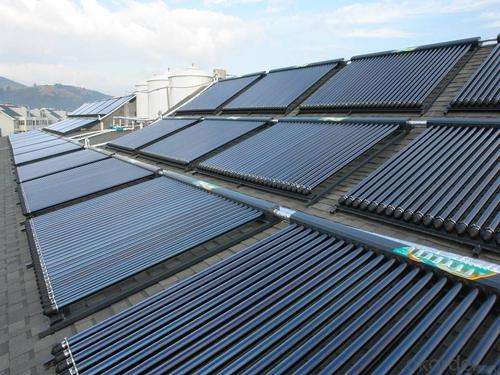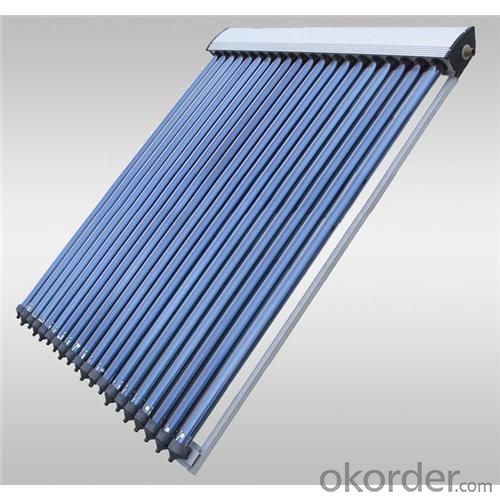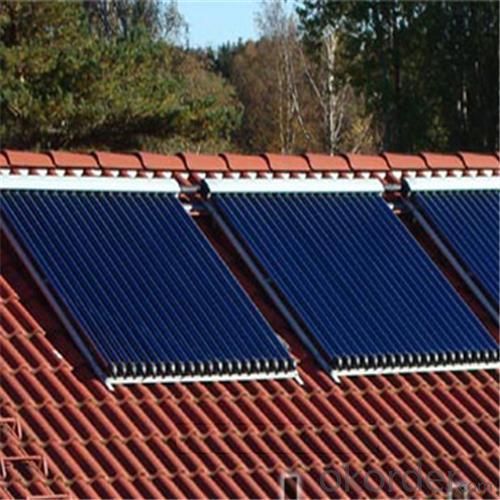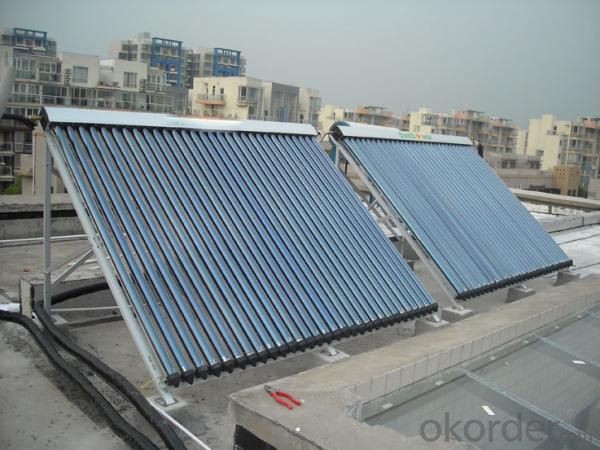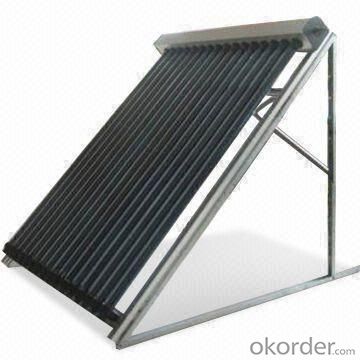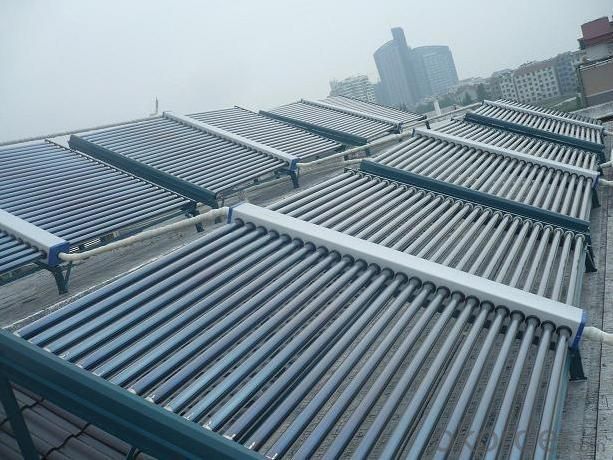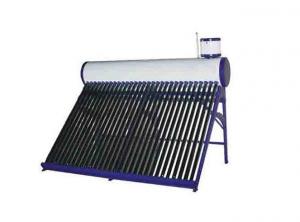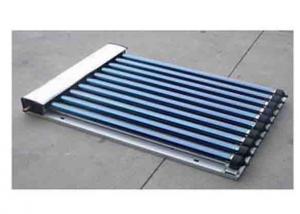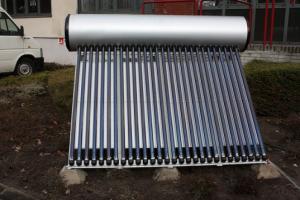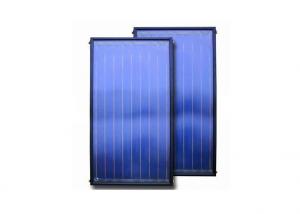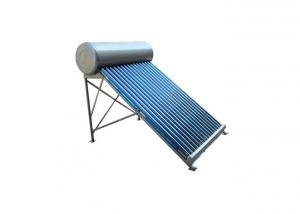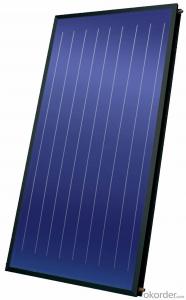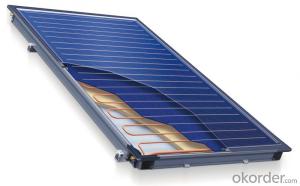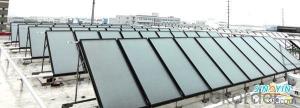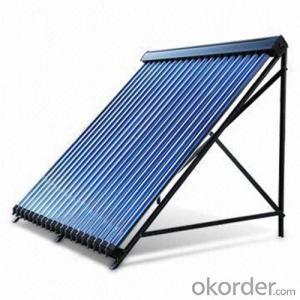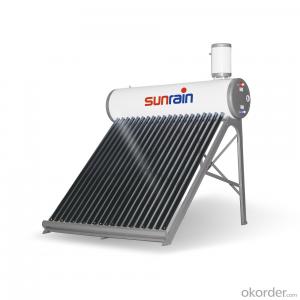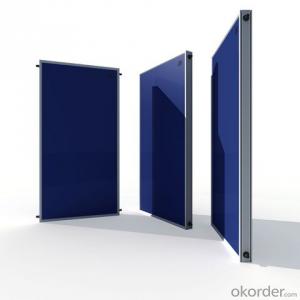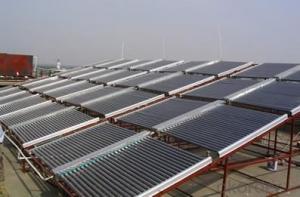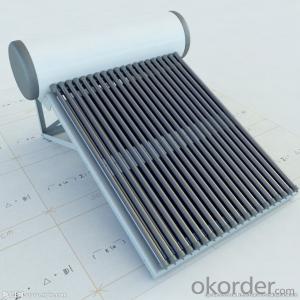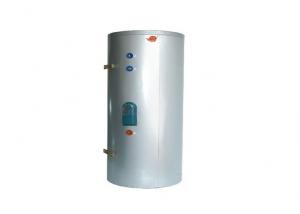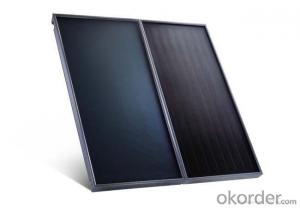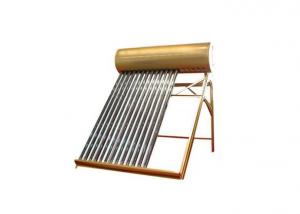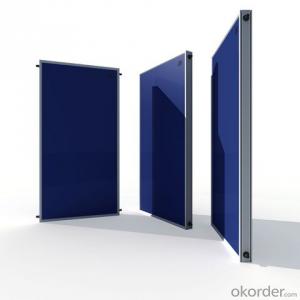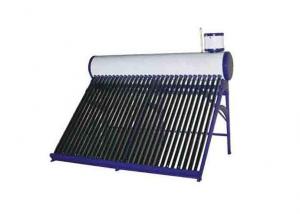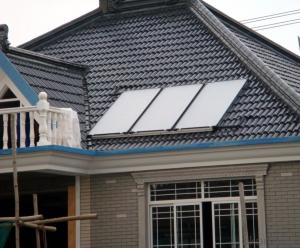Emissivity Solar Collectors for Water Heater, Pressurized Emissivity Solar Collectors
- Loading Port:
- China main port
- Payment Terms:
- TT OR LC
- Min Order Qty:
- 5 set
- Supply Capability:
- 10000 set/month
OKorder Service Pledge
OKorder Financial Service
You Might Also Like
Specification
manifold (inner) | red copper |
manifold (exterior) | aluminum alloy |
glass tube dimensions | 58mm * 1800mm |
daily efficiency | ≥55% |
heat preservation | 72 hours |
hail resistance | 25mm |
max pressure | 7 bar |
coating of vacuum tube | ALN/AIN-SS/CU |
heat pipe | anti-freezing > -35 degree |
certificate | Solar Keymark, EN12975,SRCC |
Serious Product
Models | L*W*H mm | Vacuum tube | Power output | Efficiency | Header mm | Frame | container loading 20FT/40HQ sets | Gross Weight kg |
SHC-8 | 1917*910*133 | 58*1800*8pcs | 939W | 0.668 | Φ35/1.0 | AL alloy | 185/445 | 27 |
SHC-10 | 1917*1130*133 | 58*1800*10pcs | 1189W | 159/385 | 33 | |||
SHC-12 | 1917*1350*133 | 58*1800*12pcs | 1440W | 149/358 | 40 | |||
SHC-15 | 1917*1680*133 | 58*1800*15pcs | 1815W | 120/290 | 49 | |||
SHC-18 | 1917*2010*133 | 58*1800*18pcs | 2191W | 100/242 | 59 | |||
SHC-20 | 1917*2230*133 | 58*1800*20pcs | 2442W | 87/210 | 66 | |||
SHC-22 | 1917*2450*133 | 58*1800*22pcs | 2692W | 83/202 | 72 | |||
SHC-24 | 1917*2670*133 | 58*1800*24pcs | 2943W | 77/188 | 79 |
Packaging & Delivery
Packaging Details: | Exporting Carton with big foaming protection |
Delivery Detail: | In 10-15 days |
Loading Quantity
Model | Tube | Tube Q.T.Y | Loading Q.T.Y/40HQ |
GSC15 | 58*1800mm | 15pcs | 315sets |
GSC18 | 58*1800mm | 18pcs | 265sets |
GSC20 | 58*1800mm | 20pcs | 248sets |
GSC22 | 58*1800mm | 22pcs | 225sets |
GSC25 | 58*1800mm | 25pcs | 200sets |
GSC30 | 58*1800mm | 30pcs | 168sets |
Details of solar collector:
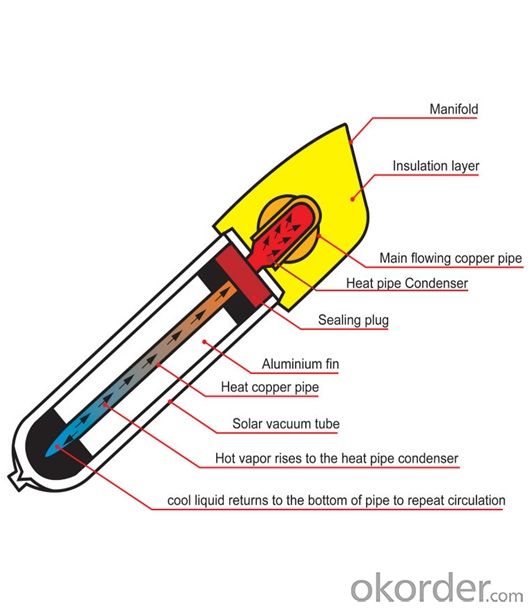
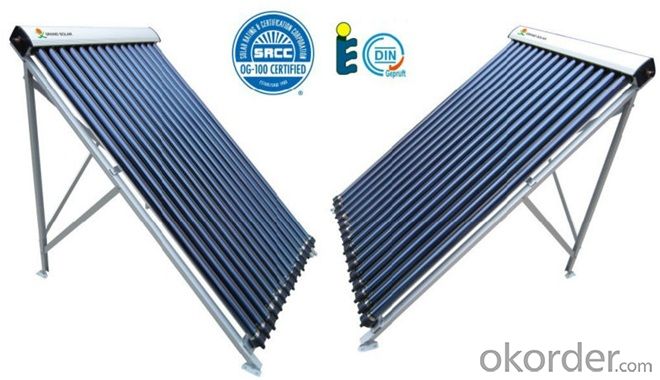
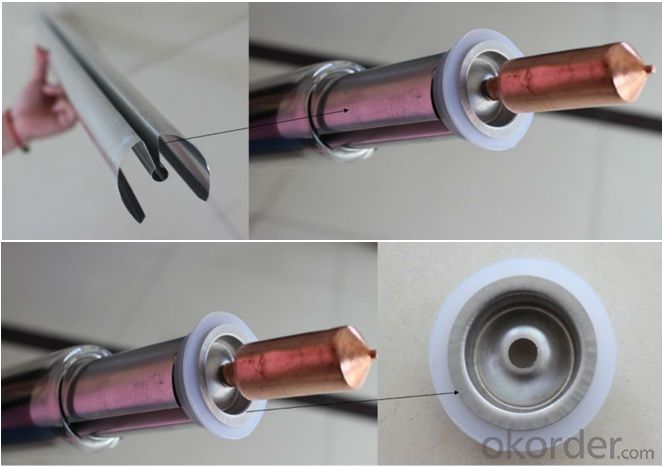
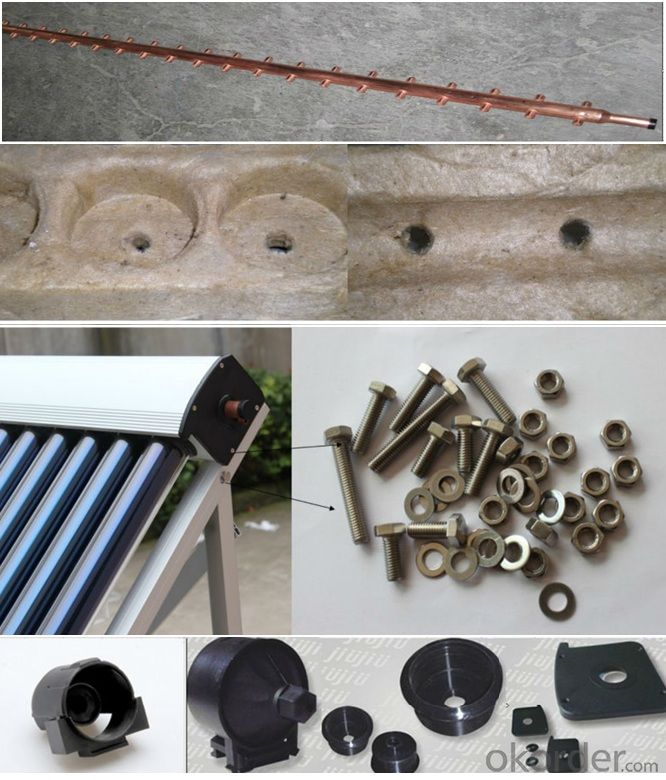
- Q: Are solar collectors suitable for heating livestock buildings?
- Yes, solar collectors are suitable for heating livestock buildings. They can effectively harness the sun's energy to provide sustainable and cost-effective heating solutions for livestock buildings, helping to maintain optimal temperature and comfort for the animals. Additionally, solar collectors can contribute to reducing greenhouse gas emissions and energy costs associated with traditional heating methods.
- Q: Can solar collectors be used for heating outdoor spaces?
- Yes, solar collectors can be used for heating outdoor spaces. By harnessing the sun's energy, solar collectors can generate heat that can be used to warm outdoor areas such as patios, gardens, or swimming pools. This sustainable and environmentally friendly method of heating can provide a comfortable outdoor environment without relying on traditional energy sources.
- Q: Can solar collectors be used for generating electricity on wearable devices?
- Yes, solar collectors can be used for generating electricity on wearable devices. With advancements in technology, solar panels can now be made smaller, flexible, and lightweight, making them suitable for integration into wearable devices such as smartwatches, fitness trackers, and even clothing. These solar collectors, also known as photovoltaic cells, can convert sunlight into electrical energy, which can then be used to power various functions of the wearable device. This can significantly extend the battery life of the device or even eliminate the need for traditional battery charging altogether. Additionally, the use of solar collectors on wearable devices aligns with the growing trend of sustainable and eco-friendly technology, as it reduces dependence on non-renewable energy sources and minimizes environmental impact. However, it is important to note that the efficiency of solar collectors on wearable devices can vary depending on factors such as the size of the solar panel, the intensity and duration of sunlight exposure, and the power requirements of the device.
- Q: What is the impact of altitude on solar collector performance?
- The impact of altitude on solar collector performance is generally positive, as higher altitudes often have clearer skies and lower air density, resulting in increased solar radiation and more efficient heat transfer. However, extreme altitudes can pose challenges such as lower atmospheric pressure and lower ambient temperatures, which may slightly decrease collector performance.
- Q: Can solar collectors be used in commercial buildings?
- Yes, solar collectors can be used in commercial buildings. They are an efficient and sustainable way to generate renewable energy, reducing electricity costs and carbon emissions. Solar collectors can be installed on rooftops or facades of commercial buildings to capture sunlight and convert it into usable energy for various purposes such as heating, cooling, and electricity. Additionally, many governments and organizations provide incentives and grants to encourage the adoption of solar technology in commercial buildings, further promoting their use.
- Q: What is the impact of air quality on the performance of solar collectors?
- The performance of solar collectors can be greatly affected by the quality of air. Accumulation of air pollutants like dust, smog, and particles on the surface of solar panels can significantly decrease their efficiency and overall power output. The presence of dust and dirt particles can form a layer of grime on the solar panels, obstructing sunlight from reaching the photovoltaic cells. This, in turn, lowers the amount of energy that can be converted into electricity, ultimately diminishing the performance of the solar collectors. Similarly, smog and other air pollutants have the ability to scatter and absorb sunlight, further reducing the amount of solar radiation that reaches the panels. Consequently, the efficiency of the solar collectors decreases as there is less energy available for conversion. Moreover, air pollution can also impact the temperature of the air surrounding the solar collectors. Higher pollution levels can lead to an increase in the ambient temperature, which can negatively affect the performance of the panels. Solar panels operate more effectively at lower temperatures, as excessive heat can cause a decline in their efficiency. In areas with high levels of air pollution, it is crucial to regularly clean and maintain solar panels in order to ensure optimal performance. By cleaning the panels and removing dust, dirt, and other pollutants, their efficiency can be improved, thereby maximizing the power output. Furthermore, it is important to note that the impact of air quality on solar collector performance varies depending on the specific type of solar technology employed. For example, concentrated solar power (CSP) systems, which rely on mirrors or lenses to concentrate sunlight, are highly susceptible to air pollution. The scattering and absorption of sunlight by air pollutants can significantly diminish the amount of concentrated solar radiation, thereby impacting the overall performance of CSP systems. In conclusion, the quality of air is a critical factor in the performance of solar collectors. High levels of air pollution can diminish the efficiency of solar panels by obstructing, scattering, or absorbing sunlight. Regular cleaning and maintenance are essential to mitigate the impact of air pollution and ensure optimal performance of solar collectors.
- Q: Can solar collectors be used in transportation?
- Yes, solar collectors can be used in transportation. They can be integrated into vehicles, such as cars, buses, and trains, to harness solar energy and power various components, including lights, air conditioning, and even propulsion systems. This helps to reduce reliance on fossil fuels and decrease greenhouse gas emissions, making transportation more sustainable and environmentally friendly.
- Q: Can solar collectors be used in advocacy for renewable energy?
- Yes, solar collectors can definitely be used in advocacy for renewable energy. Solar collectors, also known as solar panels, convert sunlight into electricity, which is a clean and sustainable source of energy. By showcasing the effectiveness and benefits of solar collectors, advocates can raise awareness about the potential of renewable energy and encourage its adoption. Additionally, solar collectors can serve as tangible examples of how individuals and organizations can actively contribute to reducing carbon emissions and combating climate change.
- Q: Where are solar collectors commonly used?
- Solar collectors are commonly used in various locations and applications around the world. One of the most common uses of solar collectors is in residential homes, where they are installed on rooftops to generate clean and sustainable energy for the household. Solar collectors are also commonly used in commercial buildings, such as offices and factories, to offset the energy consumption and reduce carbon emissions. In addition to buildings, solar collectors can be found in large-scale solar power plants, where they are used to generate electricity on a utility scale. These solar power plants often have vast arrays of solar collectors that track the movement of the sun and convert sunlight into electricity. Solar collectors are also used in remote and off-grid locations, where access to traditional energy sources may be limited. Examples include rural areas, campsites, and even space stations. In these cases, solar collectors provide a reliable source of energy for various needs, such as lighting, heating, and powering electronic devices. Furthermore, solar collectors are commonly used in the agricultural sector. They can be utilized for water heating in greenhouses, providing optimal conditions for plant growth. Solar collectors are also used for irrigation purposes, where the collected solar energy powers pumps to distribute water to crops. Overall, solar collectors are versatile and can be used in a wide range of applications, including residential, commercial, industrial, remote, and agricultural settings. Their ability to harness the power of the sun makes them a valuable and sustainable energy solution.
- Q: Can solar collectors be used for generating electricity on rooftops in cities?
- Yes, solar collectors can be used for generating electricity on rooftops in cities. Solar panels, also known as solar collectors, can be installed on rooftops to harness sunlight and convert it into electricity. This is a sustainable and renewable way to generate power, especially in urban areas where there may be limited space for other types of power generation. Solar energy is a clean and abundant source of power, making it an ideal solution for cities looking to reduce their carbon footprint and dependence on fossil fuels.
Send your message to us
Emissivity Solar Collectors for Water Heater, Pressurized Emissivity Solar Collectors
- Loading Port:
- China main port
- Payment Terms:
- TT OR LC
- Min Order Qty:
- 5 set
- Supply Capability:
- 10000 set/month
OKorder Service Pledge
OKorder Financial Service
Similar products
Hot products
Hot Searches
Related keywords
